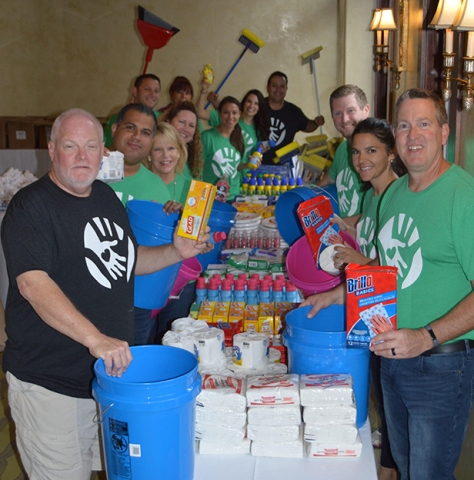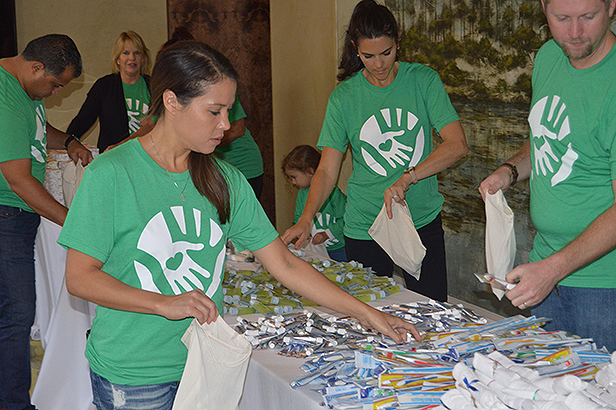5 Myths About CSR, According to Tammi Runzler of CSRConnections

You know that incorporating corporate social responsibility activities during your events can be a win-win all around – for your attendees, charities in destinations that host your events, the destinations themselves, and of course, your organization. Yet you might be feeling overwhelmed and not sure where to begin.
While incorporating CSR can seem daunting, there are more resources than ever available to support planners in this process. To help inspire you to take that next step, Tammi Runzler, co-founder of CSRConnections, a corporate social responsibility company that helps match up organizations with the right CSR activities for their events, shared some of the biggest myths (and truths) about CSR worth keeping in mind.
Myth No. 1: The activity has to be a distinctive event held in a large space, in a set amount of time, with a large group of people.
CSR doesn’t have to be an all-or-nothing activity. While having a couple of hours and a big space along with a large budget to dedicate to a CSR activity is ideal, that is rarely realistic.
“I love it when a conference has 3,000 people in a giant space doing meal packing and it’s a huge, scheduled, distinctive component of their program – those are amazing and that’s typically the perception that planners have when they start visualizing incorporating CSR into their program,” Runzler says. “But the truth is, that isn’t the only way that you can do socially responsible activities… there are so many other creative options.”
For example, if you have no time in your event schedule to fit in a CSR activity, consider hosting a donation program where each attendee brings a new children’s book to help underprivileged kids in local schools, or a non-perishable food item to help a local food bank. You can also layer a CSR activity on top of a scheduled event such as a reception, which in turn helps encourage creative networking, Runzler suggests.
Myth No. 2: It’s going to be too complicated to plan.
Start by thinking about your goals and asking why you’re wanting to incorporate CSR in the first place. Is it because your attendees are asking about it and/or you’re wanting to make CSR part of your event’s culture? Once you know what you’re trying to achieve, get creative and come up with options for achieving your goals.
“The biggest myth that I run into all the time is the planner’s vision of what a CSR activity has to look like, and if that’s not available, then they think they can’t do it,” Runzler says. “However, there are resources available now throughout our industry that can provide valuable information and provide support in making the right choice for any situation.”
She added, “Once you identify a resource, usually it’s a simple process to identify critical information and goals, and from there the perfect activity can be sourced.”
Myth No. 3: Attendees won’t want to participate.
A lot of planners fear doing something they think their event participants won’t be receptive to or want to engage in. But you won’t know until you try, and once you do, you’ll see that most participants will be more engaged and appreciative to the organization for giving them an opportunity to give back, Runzler says.
“Some of my most emotional and successful events have started out with that myth in the conversation – one was an older demographic of executives that held meetings every year but had never done anything like that before,” Runzler explains. “They all did a very creative activity to benefit a children’s hospital where they decorated and personalized gift backpacks with appropriate age ranges including infant, toddler, school-age kids and young adolescents.”
She added, “The meeting planner was terrified that people wouldn’t show up or would walk out, but they were really into it and engaged until the very end.”

Myth No. 4: It’s going to be expensive.
Yes, there is a cost to doing CSR (a planned, coordinated activity can run between $50-$125 per participant, Runzler says), however, if you don’t have a budget for it, there are low-cost options that still allow you to do something meaningful. For example, having attendees assemble hygiene kits for the homeless is a quick and inexpensive activity that anyone can do.
Myth No. 5: It’s difficult to get resources for CSR.
More than ever, the events industry is embracing the fact that it has a significant role to play in helping planners incorporate CSR, says Runzler. Greater education is being offered on the topic, and destinations are working harder to at least be able to point planners in the right direction.
“If you’re a meeting planner and you ask the sales and services team at a hotel for a transportation company recommendation, they can do that for you very easily, but this has not always been true when it comes to resources for CSR,” Runzler says. “However, the tide is turning and the industry is starting to rise to the occasion.”
Now that we’ve debunked some of the biggest misconceptions about CSR, here are some truths to keep in mind:
Everyone benefits. This includes the organization making the decision to be socially responsible, the sponsor of the activity, the participants doing the activity, the person or organization receiving the donation, and the local community.
It’s going to be well received. People generally love participating in feel-good activities, and for many event participants, having the chance to do something to give back while at an event is something they will remember and positively associate with your organization. In fact, CSR is one of the most highly rated items on post-event surveys, Runzler says.
It reflects positively on your organization. The fact that an organization has made a conscious decision and effort and put resources aside to incorporate CSR is a positive aspect of an organization’s story from a cultural and PR perspective. “Research shows that people want to connect themselves with organizations and events making positive changes in our world, so it’s a wonderful opportunity for planners to deliver what their attendees and sponsors want,” Runzler says.
It helps tackle some of our world’s serious problems. From hunger to homelessness to disaster relief and helping children in need, CSR in the events industry is making a positive difference by addressing and shedding light on society’s biggest challenges, Runzler says.
It benefits the destination. More destinations are recognizing the positive impact of organizations wanting to be a good visitor while holding events in their cities. Besides the obvious economic impact of events, there is the social impact of groups doing something positive to help local communities.
It’s fun; it’s energizing, and it offers a very creative way for people to network. People network differently when they’re doing a CSR activity than when they’re at a cocktail reception or on the trade show floor. “You talk about different things, share different experiences and you’re more emotionally open when you’re doing a CSR activity,” Runzler says. “It’s fun and a great way to energize your program.”
Don’t miss any event-related news: Sign up for our weekly e-newsletter HERE and engage with us on Twitter, Facebook, LinkedIn and Instagram!


Add new comment